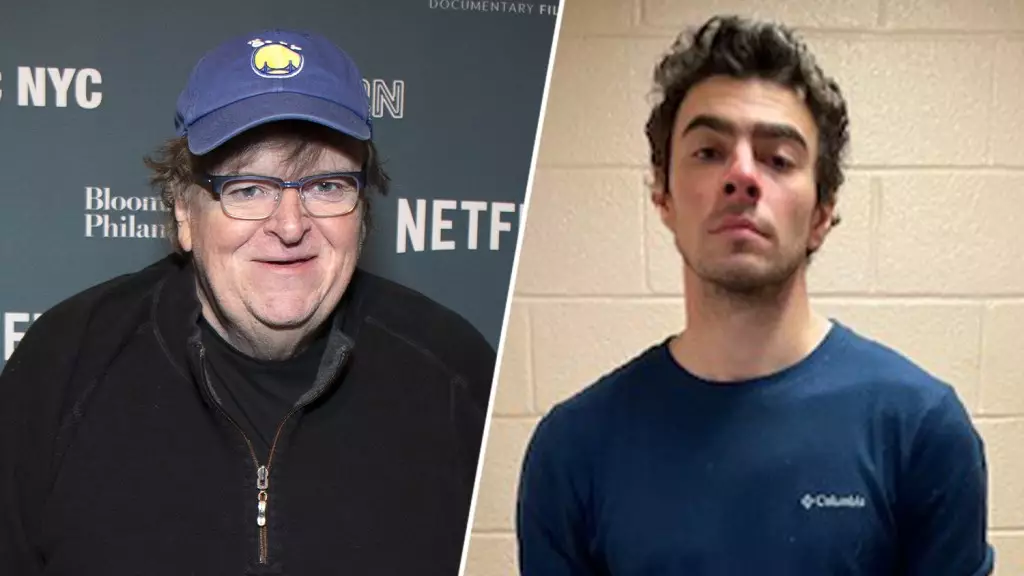The recent arrest of Luigi Mangione, a suspect in the shooting death of UnitedHealthcare’s CEO Brian Thompson, has sparked a torrent of responses, especially from prominent figures like filmmaker Michael Moore. In his open letter, Moore confronts the implications of violence within the context of systemic failures in the American healthcare system and addresses the manifestations of public outrage that have emerged. He explicitly condemns murder while simultaneously acknowledging the cause of widespread frustration directed at the healthcare industry, positioning his commentary as a critique of systemic negligence rather than an endorsement of violence.
Moore states that such anger towards for-profit healthcare entities is justified. He emphasizes that the frustrations boil down to decades of exploitation where lives have been compromised due to corporate greed. The broader implications of this anger are critical to understand. Rather than viewing Mangione’s actions as a reflection of a justified response to systemic inequality, Moore reframes the issue as a cry for reform and a call to address the root causes of this malcontent.
While Moore vehemently asserts his condemnation of murder, he engages in a complicated discourse about the term “rich on rich crime.” This phrase highlights the disparities within socio-economic realities, illustrating a divide between those who hold power and wealth, and those left vulnerable by the very system that purports to provide care and support. It raises questions about the ethics of wealth accumulation in a healthcare system that results in mass suffering—a notion Moore does not shy away from exploring.
It is essential to underline that Moore is not indicating that violence is acceptable as a form of protest or remedy. Instead, he constructs an argument about the societal circumstances that lead individuals to such extremes. In this regard, the issue transcends the importance of any single act of violence and instead leans toward discussions on public policy, systemic oppression, and the need for significant change within the healthcare arena.
Healthcare: A National Crisis
The perspectives echoed in Moore’s letter bring to light the immense struggles faced by millions of Americans trapped in a healthcare system rife with barriers, high costs, and corporate oversight. Verbalizing frustrations about denied care and crushing medical debt is essential to understanding the public sentiment surrounding healthcare failings in the U.S. It’s not merely about loss of life; it is about the socioeconomic impact and the consistent disregard for human dignity and health in the face of corporate profit.
By fostering an environment where profit supersedes health, insurance companies perpetuate cycles of poverty, anxiety, and ultimately, disenfranchisement. Moore’s message serves as an indictment against this climate, which has left citizens feeling justifiably outraged.
Within Moore’s discourse lies a moral imperative—an urgent call for reform that addresses the inequities faced by ordinary people. His reference to streaming his documentary “Sicko” underscores his commitment to educating the public about these issues. While an open letter written in response to a tragedy might seem to address a singular act of violence, it ultimately circles back to the greater narrative of societal neglect.
Moore’s engagement with this tragedy is also a narrative push against the status quo. By refusing to allow the media to ignore the underlying issues that perpetuate this systemic crisis, he champions the voices of those who have suffered in silence.
Thus, while Moore aligns himself with the anger expressed in response to Thompson’s death, he ultimately calls for a more profound awareness and mobilization towards advocating for healthcare reform. The path forward is not merely fueled by outrage but must also be grounded in collective action and policy change to address the fundamental flaws within the healthcare system.
In grappling with the repercussions of this unfolding narrative, it becomes clear that addressing public health should be a priority steeped in empathy and justice, thereby ensuring that no more lives are lost due to an inadequate healthcare framework. The urgency for a reformed system is pervasive, and it is clear that the ripples from this tragic incident should lead not to more violence, but to more understanding and action.
